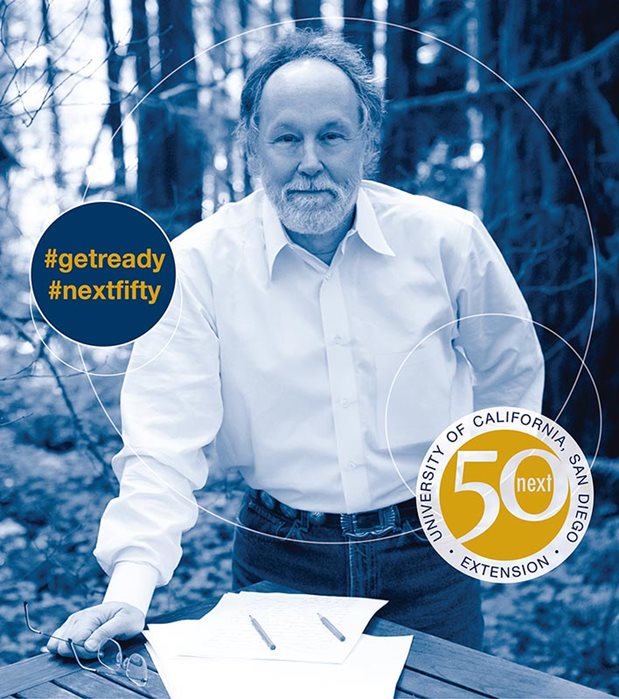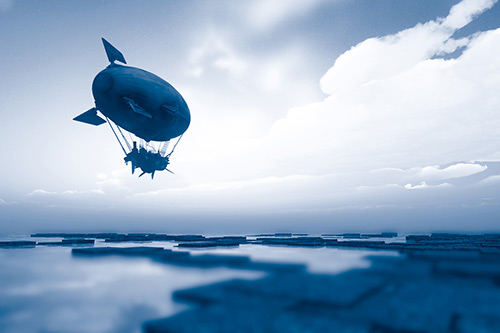12 January 2016
50 Voices of the Future: Barry Lopez on environmentalism

In honor of UC San Diego Extension's first 50 years, 50 Voices of the Future asks thought leaders about the trends, breakthroughs and social advances they foresee over the next 50 years.
Barry Lopez is, by turns, optimistic and remarkably bleak when he talks about what the world might look like five decades from now.
The acclaimed author, who lives in Oregon, envisions a future in which the forces of anti-intellectualism gain more and more power, threatening our ability to meet the world’s biggest challenges. And yet Lopez — whose non-fiction books, novels and essays have won countless awards — has enormous faith in the power of writers and other artists to influence world events for the better, and he sees a future in which their power also increases.
As a writer known for his global travels and fascination with the natural world, Lopez is terrified about climate change and what he predicts will be an increasing scarcity of basic resources. But he also has an overwhelming confidence in human inventiveness, especially when the sustainability of human life is at stake. “That’s the doorway to human survival,” he says.
Why is the work you do important?
I don’t know that it is. We’ve become so obsessed with the importance of the individual that we’ve lost sight of the fact that it’s the group of people doing their work together that makes sense. The things that need to be done to provide us with a stable future aren’t going to be done by one person. It’s going to require the full range of the human imagination, and a full range of people who can think creatively and bring a certain determination to the task.
That said, I see myself as a practitioner in a long line of women and men who have a sense of social responsibility when it comes to storytelling. I’m very happy if a story that I write or a book that I write affects people in a positive way — provides some kind of illumination for people in sorting out what they want their lives to mean. The crux for me is pretty simple: Does this story help? Does it help someone sort out their own confusion as a human being in a complicated world?
What are the influential/exciting developments happening in your field now and why?
I don’t know that I am excited. Nothing that goes on in the arts makes what happened earlier in the arts irrelevant or obsolete. I don’t think there are any developments in writing that are new. I just take a step back when the discussion turns to who are the people we really should be listening to. Because writing is metaphorical. It’s the making of a pattern that has some kind of effect on the reader. People are so distracted by day-to-day needs of their lives that they’ve forgotten what they wanted their lives to mean. And that’s where the arts function. That is the necessity of the arts: they provide that bridge between the life you are living and the life that you imagine you could live if you remembered what it is you wanted to do with your life. I’m not talking about an occupation. I’m talking about the way you carry yourself in the world. What you stand for in the world. What you want people to say about your life when you are no longer with us.
What’s the next big thing?
In January, I will have been publishing work for 50 years. I know a lot of people who write for magazines, and many of us have come to feel the same way — that the world of magazines has become so commercialized, so dependent on making a profit, that magazines are more trouble to write for than you feel you can afford. So what I expect to see is a story told in a different way than the way most of us get our information. What I see coming is the reappearance of a kind of story that makes the reader understand that ancient “we” — that the storyteller is as concerned about your fate as her or she is of her own fate.

How big of an impact will your field play in shaping the future of the San Diego region and beyond?
Writing and the arts will always play a role in shaping the future. The arts are there for an indispensable reason. They represent the only hope that people have for survival. When you read a book that profoundly affects you, you step back into the world in a different way and you behave differently. And the same thing happens with music or painting or photography or any artistic function. You come away with a resolve to live in a different way or to commit to some or other form of action. So it’s incomprehensible to me that the arts wouldn’t play a stronger role in the future. My question about the arts is: will they still play an effective role? Can they get people through this miasma of confusion that iPhones are never going to penetrate? I don’t know. But I will be doing this until I’m dead, and someone will come along after me in the same way that I came along after other people.
Hop into your time machine…what does the future look like for this field in 50 years? How can individuals/companies get prepared for what’s next?
I read about reserves of natural resources that are dwindling. I read about ocean acidification. It’s within the realm of possibility that there won’t be any pelagic fish in the ocean in 50 years. Where there were trees once growing there will be desert. Scarcity of clean water. Scarcity of gasoline and oil. And that scares and paralyzes people. There’s an impulse to punish the messenger. We have a presidential candidate declaring climate change a hoax. But you know what else you will see — invention. That’s the doorway to human survival. We’ve proven ourselves again and again and again to be inventive. And you can’t know at this point what it is that we’re going to invent to survive — but we will invent something.
Lopez discussed the intersection of environmental action and art with world-renowned percussionist Steven Schick, a UC San Diego professor of music, at a free Helen Edison Lecture Series presentation 7 p.m. Wednesday, Jan. 20 in the Price Center East Ballroom on the UC San Diego campus.